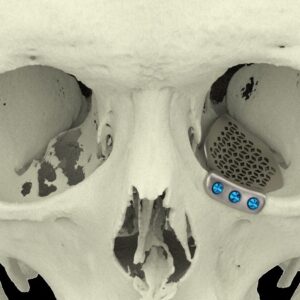Description
What is Enucleation?
Enucleation is a surgical procedure that involves the complete removal of the eyeball from the eye socket (orbit). It’s considered a last resort surgery performed when an eye is severely diseased, injured, or painful beyond salvage.
Procedure:
- Anesthesia: General anesthesia is typically used to keep you unconscious during the surgery.
- Incision: A surgical incision is made around the cornea, the clear dome at the front of the eye.
- Muscle Dissection: The muscles that control eye movement are carefully detached from the eyeball.
- Eye Removal: The optic nerve and blood vessels connecting the eye to the brain are severed, and the eyeball is removed from the socket.
- Implant Placement: An artificial sphere (implant) is often placed in the socket to maintain its shape and volume.
- Muscle Reattachment: The eye muscles are reattached to the implant to allow for some degree of movement of the prosthetic eye (to be fitted later).
- Closure: The surgical site is stitched closed.
Suitable Candidates:
- Patients with a blind, painful eye with no chance of vision improvement.
- Individuals with severe eye infections that are unresponsive to medical treatment and pose a risk to the healthy eye.
- People with certain eye tumors where enucleation offers the best chance of preventing cancer spread.
- Those with significant eye trauma with severe damage beyond repair.
Unsuitable Candidates:
- Patients who are generally not healthy enough to undergo surgery.
- Individuals with a high risk of bleeding or infection.
- People who have a healthy eye with good vision and the potential for improvement.
Advantages:
- Pain Relief: Can effectively eliminate pain from a severely diseased or injured eye.
- Infection Control: Prevents the spread of serious eye infections to the healthy eye.
- Tumor Removal: Offers a potential cure for some eye cancers.
- Cosmetic Improvement: Can improve the appearance of a disfigured eye.
Complications:
- Bleeding: Bleeding can occur during or after surgery, but is usually manageable.
- Infection: Although uncommon, infection is a serious complication requiring prompt medical attention.
- Pain: While the goal is pain relief, some post-operative discomfort can occur.
- Loss of Vision: Enucleation removes the eye, resulting in complete vision loss in that eye.
- Orbital Shrinkage: Over time, the eye socket may shrink, affecting the fit of the prosthetic eye.
- Double Vision: In rare cases, muscle reattachment issues can lead to double vision.
Preoperative Care:
- Comprehensive eye exam to confirm the diagnosis and determine if enucleation is necessary.
- Discussion of risks and benefits with your ophthalmologist.
- Medical evaluation to ensure you can undergo surgery safely.
- Blood tests and other tests as needed.
Postoperative Care:
- Pain medication to manage discomfort.
- Eye patch or shield to protect the surgical site.
- Antibiotic/steroid eye drops to prevent infection and inflammation.
- Wearing a temporary prosthetic eye (conformer) to maintain the shape of the socket.
- Fitting for a permanent prosthetic eye later in the healing process.
- Regular follow-up appointments to monitor healing and address any complications.



Reviews
There are no reviews yet.